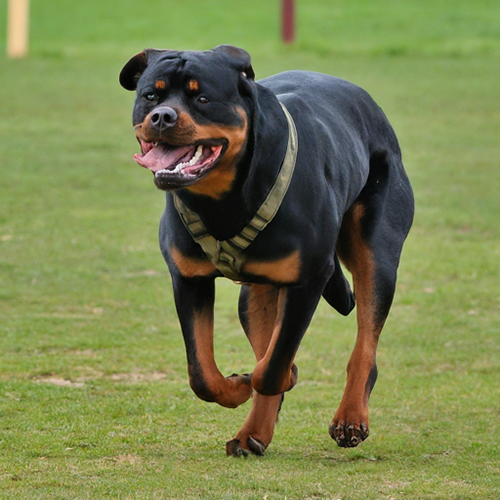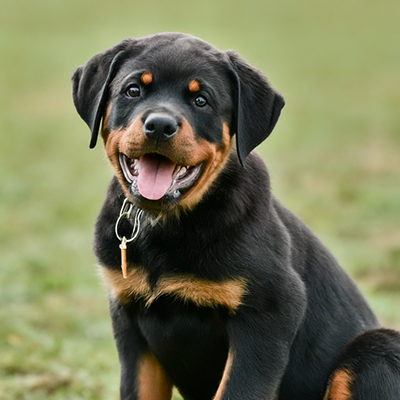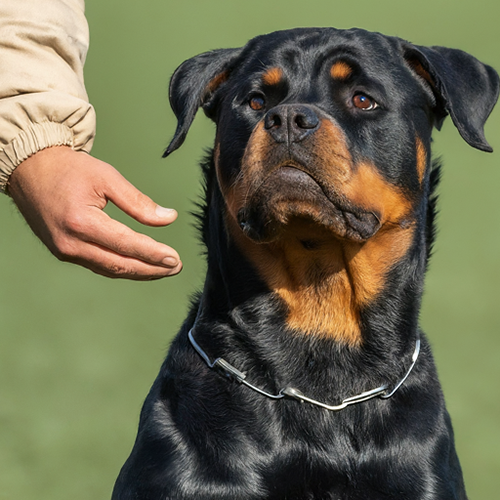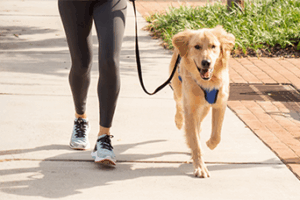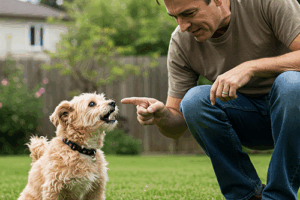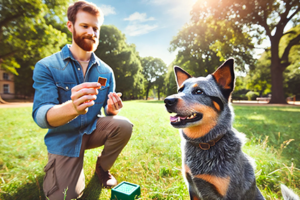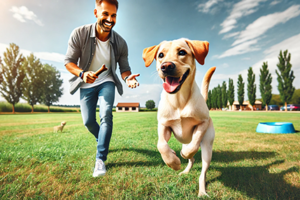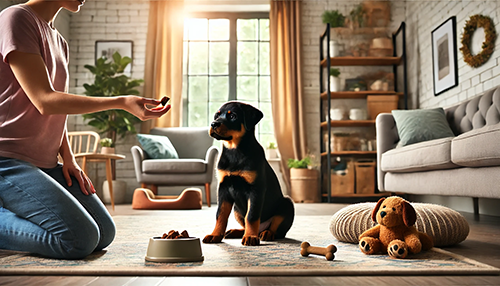
When Rottweiler training, it’s important to remember that they are intelligent, loyal, and determined dogs. Not only do they need proper obedience training, but they also need socialization and exercise to keep them happy and healthy.
With patience, consistency, and positive reinforcement, Rottweilers can be great family pets and loyal companions. Let’s explore the basics of Rottweiler training, including using positive reinforcement, establishing boundaries, and socializing your Rottweiler.
What Type of Training is Greatest for Rottweilers
Training a Rottweiler can be a rewarding experience, but it is essential to remember that they require consistent and dedicated training. Positive reinforcement training is the best type of training for Rottweilers.
It focuses on praising and rewarding good behavior and avoiding punishing bad behavior. Socialization is critical for Rottweilers. This training helps them become comfortable with new people, animals, and situations.
Obedience training helps Rottweilers learn commands and boundaries. It teaches them to respond to commands like “sit” and “stay.” Agility training is an excellent way to exercise and stimulate an active Rottweiler. Rottweiler Schutzhund training is also becoming very popular and is something that all owners should at least consider.
It involves obstacle courses, agility tunnels, jumps, and more. Crate training is a valuable way to potty train Rottweilers and helps them learn to stay calm and relaxed when left alone. With consistency, patience, and the proper training, owners can help their Rottweilers become well-adjusted and obedient.
How Does a Rottweiler’s Nature Affect Their Training
Rottweilers typically have a strong-willed and dominant nature. It is essential to have an experienced trainer who can provide consistent, firm, and fair leadership.
Patience and consistency are crucial when Rottweiler training, as they can be slow to learn and require repetition to retain new commands. Positive reinforcement is also vital in Rottweiler training, as they are naturally motivated by treats, praise, and play.
Early socialization ensures your Rottweiler is comfortable interacting with people and other animals. Setting boundaries and limitations for your Rottweiler from the beginning of their training is crucial to avoid any behavioral issues later.
With the right approach, dedication, and consistency, you and your Rottweiler can build a strong bond and a trusting relationship.
Is It Easy to Train a Rottweiler
These intelligent and loyal dogs are eager to please and respond well to positive reinforcement and consistency. However, they can also be strong-willed and require patience and dedication during training.
Training should begin as soon as possible for the best results, as puppies are more open to learning. Socialization and exposure to new people and environments are also vital for Rottweilers, as they will help them become more well-rounded pets.
When it comes to training, it’s essential to ensure that your Rottweiler gets plenty of playtime and walks. These active and energetic dogs need lots of exercise, and it’s a great way to burn off excess energy and keep them in a good mood. Training should also be a fun experience for the dog, so include plenty of treats and praise.
With the right approach, a Rottweiler can become a great companion and a well-behaved family pet. With patience and dedication to training, you can ensure your Rottweiler is a happy and successful addition to your home.
At What Age to Start Rottweiler Training
It is crucial to start Rottweiler training as soon as possible to ensure your pup grows up well-behaved and obedient.
The ideal time to start training is around 8-10 weeks of age. During the puppy stage, focus on teaching basic commands such as “sit,” “stay,” and “come.” As your Rottweiler gets older, you can incorporate more advanced controls such as “heel,” “down,” and “leave it.”
Socializing your Rottweiler with other people and animals at an early age is also essential. This will help avoid potential aggression issues in the future. When training your pup, use treats and praise to encourage them to obey commands.
Make sure to have regular training sessions with your dog. This will help ensure your pup understands what is expected of them. You can successfully train your Rottweiler with perseverance and stability to create a strong bond with them.
How Can I Ensure That My Rottweiler is Well-behaved
Spending time with your Rottweiler daily is vital to starting on the right foot. It provides plenty of positive reinforcement for desired behavior.
Additionally, it is vital to create a consistent and firm training plan that includes clear expectations, rewards, and consequences and establish yourself as the pack’s leader.
Positive reinforcement techniques such as treats and verbal praise should be used, while physical punishments should be avoided.
Socialization is vital; it is critical to introduce your Rottweiler to new people, animals, and environments as early as possible. Challenging them with new tasks and tricks will help ensure good behavior and a well-trained dog.
Additionally, providing your Rottweiler with plenty of mental stimulation is essential to help keep them calm and well-behaved.
Lastly, sticking to a regular schedule and providing regular vet check-ups is vital to ensuring the health and well-being of your pup. You and your Rottweiler will have a long and happy life together with the right training plan and dedication.
What are the Most Common Missteps to Avoid When Training a Rottweiler
Rottweiler training can be challenging, but it can also be a rewarding experience with the proper techniques. One of the most widespread mistakes people make when preparing their Rottweiler is not providing enough daily exercise and mental stimulation.
Rottweilers need plenty of physical and mental activities to stay healthy and happy. Another mistake is not establishing clear rules and boundaries. Setting clear rules and boundaries early on ensures that your Rottweiler knows what is expected of them. Allowing your Rottweiler to become dominant is also a common mistake.
Rottweilers are strong-willed and can quickly become dominant if not adequately trained. Establishing yourself as the alpha and remaining consistent with your commands is essential.
Positive reinforcement is another important factor in training a Rottweiler. It is the best way to reward good behavior and encourage your Rottweiler to follow your commands.
Lastly, consistency is vital. Rewarding good behavior consistently and remaining consistent with your powers is essential. With the proper techniques and consistency, you can successfully train your Rottweiler.
What 5 Tips Do You Have for Owners of Rottweilers with Behavioral Problems
Rottweiler training can seem daunting, but you can create a happy, obedient pup with consistent effort. To get you started, here are some tips for successful Rottweiler training.
- Ensure your Rottweiler gets plenty of exercise and mental stimulation. Without it, boredom can lead to destructive behaviors. Set clear rules and boundaries for your pup, and enforce them consistently.
- Provide positive reinforcement whenever your Rottweiler behaves how you would like them to. This can be anything from a treat to verbal praise. Conversely, if your dog behaves in a way you don’t like, firmly discourage it.
- Enroll in obedience classes to help your pup learn more complex commands. Not only will your Rottweiler learn more tricks, but you’ll also develop a closer bond with your canine companion. However, if you’re having trouble training your puppy, seek help from a certified dog behaviorist.
- Give your Rottweiler plenty of love and affection.
- Treats and training are necessary, but a loving relationship is just as essential. With patience and dedication, Rottweiler training can be an enjoyable experience.
Their Environment is Important
When training your Rottweiler, creating a safe and secure environment is vital. This means finding a place free from distractions and noise, which will help your dog focus on the tasks you are teaching them.
It is also essential to keep the environment consistent, as this will help your Rottweiler become comfortable and secure. Ensure their domain is positive and motivating, which will help your Rottweiler learn more quickly and effectively.
Your Rottweiler should also have plenty of space to move around and explore, which will help it become confident in its environment. Finally, ensure that the domain is not too noisy or chaotic, as this can overwhelm a Rottweiler and cause it to become stressed or anxious.
By following these steps, you can guarantee that your Rottweiler is in a safe and secure environment, which will help them achieve their training goals. The environment is especially important when Schutzhund rottweiler training.
DISCLAIMER: The information on shihtzudoginformation.com is intended for general knowledge and informational purposes only. The content is not a substitute for professional veterinary advice, diagnosis, or treatment. Always seek the advice of your veterinarian or other qualified animal health provider with any questions you may have regarding your dog’s health or medical condition.
References
- American Veterinary Society of Animal Behavior (AVSAB) Position Statement on Puppy Socialization: https://avsab.org/wp-content/uploads/2018/03/Puppy_Socialization_Position_Statement_Download_-_10-3-14.pdf
- American Kennel Club (AKC): https://www.akc.org/dog-breeds/rottweiler

